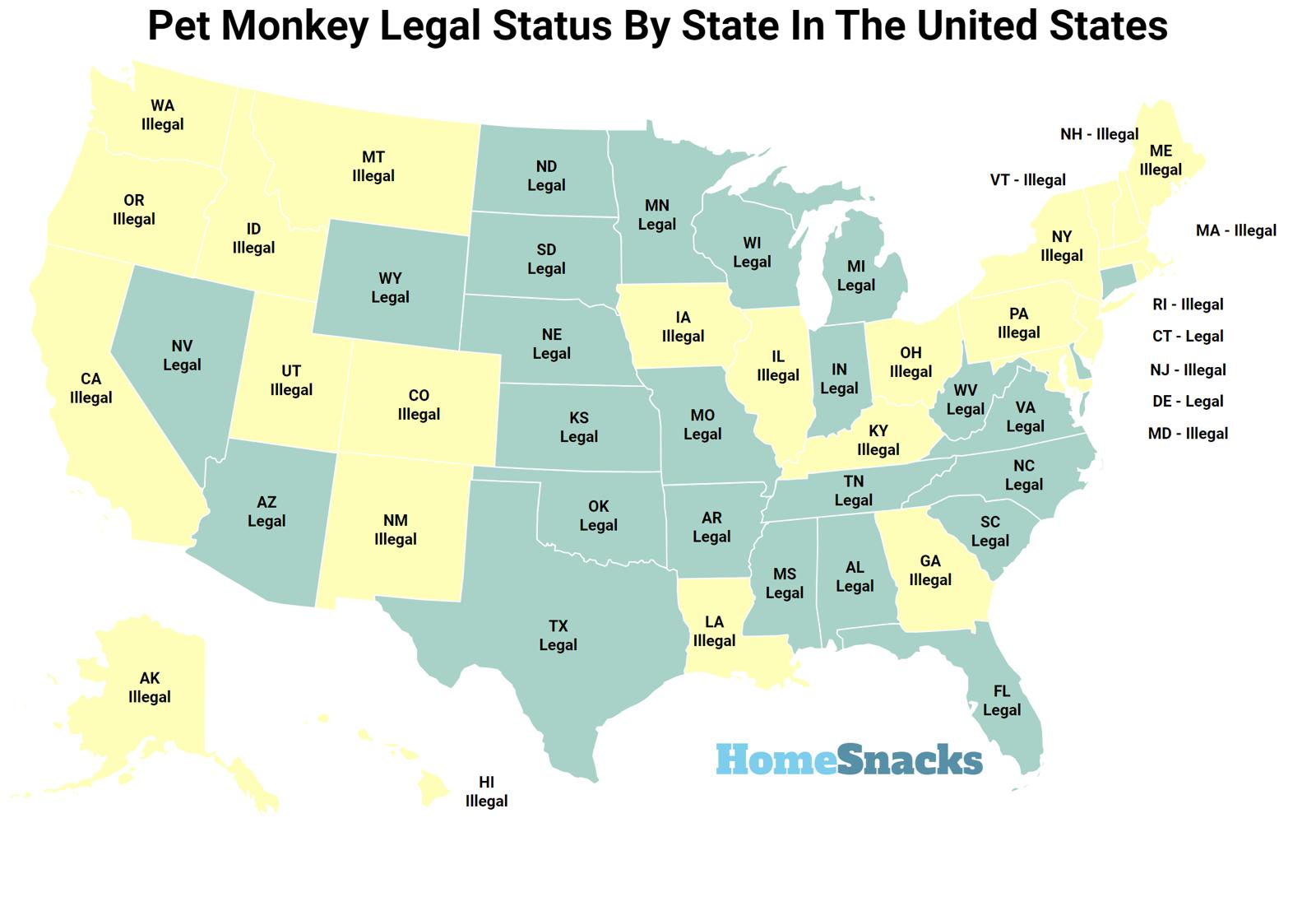Pet monkeys laws research summary. We researched the legality of monkeys as pets across the United States. Much like every monkey has a cap, every state in the US has it’s own laws regarding the ownership of monkeys as pets. Here are the key points.
-
Monkeys are legal pets in 25 states, including Texas, Florida, and North Carolina.
-
Monkeys are not legal pets in 25 states like California, Oregon, and New York.
Map Of Where Monkeys Are Legal Pets In The US
In the eclectic world of exotic pet ownership, the desire to have a primate companion often swings into the hearts of animal enthusiasts. However, the legality of bringing a pet monkey into your home varies across the United States, creating a veritable jungle of regulations. Whether you’re considering a capuchin in Connecticut or a tamarin in Texas, you need to where the law stands on monkey business.
States where it is legal to have a pet monkey include Alabama, Arizona, Arkansas, Connecticut, Delaware, Florida, Indiana, Kansas, Michigan, Minnesota, Mississippi, Missouri, Nebraska, Nevada, North Carolina, North Dakota, Oklahoma, South Carolina, South Dakota, Tennessee, Texas, Virginia, West Virginia, Wisconsin, and Wyoming.
States where it is illegal to have a pet monkey include Alaska, California, Colorado, Georgia, Hawaii, Idaho, Illinois, Iowa, Kentucky, Louisiana, Maine, Maryland, Massachusetts, Montana, New Hampshire, New Jersey, New Mexico, New York, Ohio, Oregon, Pennsylvania, Rhode Island, Utah, Vermont, and Washington state.
I personally don’t see why you’d want a pet monkey. I’ve seen enough Friends episodes to know they’ll leave you to become a famous actor.
States Where A Pet Monkey Is Legal
Monkeys are allowed throughout the Midwest and South. It could have something to do with a general inclination towards lax regulation, a culture more accepting of exotic pets, or a love for monkeys. Who doesn’t love a monkey?
- Alabama – Legal
- Arizona – Legal
- Arkansas – Legal
- Connecticut – Legal
- Delaware – Legal
- Florida – Legal
- Indiana – Legal
- Kansas – Legal
- Michigan – Legal
- Minnesota – Legal
States Where A Pet Monkey Is Illegal
Monkeys are typically not allowed as pets on the coasts. These states might have concerns over health risks, the ability of people to care for exotic animals, or animal welfare concerns.
Pet Monkey Laws By State
| State | Pet Monkey Legal Status | Permit? |
|---|---|---|
| Alabama | Legal | Yes |
| Alaska | Illegal | – |
| Arizona | Legal | – |
| Arkansas | Legal | – |
| California | Illegal | – |
| Colorado | Illegal | – |
| Connecticut | Legal | – |
| Delaware | Legal | Yes |
| Florida | Legal | – |
| Georgia | Illegal | – |
| Hawaii | Illegal | – |
| Idaho | Illegal | – |
| Illinois | Illegal | – |
| Indiana | Legal | Yes |
| Iowa | Illegal | – |
| Kansas | Legal | – |
| Kentucky | Illegal | – |
| Louisiana | Illegal | – |
| Maine | Illegal | – |
| Maryland | Illegal | – |
| Massachusetts | Illegal | – |
| Michigan | Legal | Yes |
| Minnesota | Legal | – |
| Mississippi | Legal | Yes |
| Missouri | Legal | – |
| Montana | Illegal | – |
| Nebraska | Legal | – |
| Nevada | Legal | Yes |
| New Hampshire | Illegal | – |
| New Jersey | Illegal | – |
| New Mexico | Illegal | – |
| New York | Illegal | – |
| North Carolina | Legal | – |
| North Dakota | Legal | Yes |
| Ohio | Illegal | – |
| Oklahoma | Legal | Yes |
| Oregon | Illegal | – |
| Pennsylvania | Illegal | – |
| Rhode Island | Illegal | – |
| South Carolina | Legal | – |
| South Dakota | Legal | Yes |
| Tennessee | Legal | Yes |
| Texas | Legal | – |
| Utah | Illegal | – |
| Vermont | Illegal | – |
| Virginia | Legal | Yes |
| Washington | Illegal | – |
| West Virginia | Legal | – |
| Wisconsin | Legal | – |
| Wyoming | Legal | Yes |
Methodology: How We Determined The Pet Monkey Laws In Each State
To determine the legality of monkeys as pets in each state, we used Saturday Night Science to conduct the following analysis:
-
Compilation of State Pet Monkey Laws. An initial step involved gathering information on monkey ownership regulations from reliable legal sources, including official state government websites, wildlife departments, and legal databases. This compilation ensured accurate and up-to-date information.
-
Legal Review Of Pet Monkey Laws: We carefully reviewed each state’s specific regulations to identify whether monkeys were allowed as pets, restricted under specific conditions, or prohibited outright. Key details, such as permit requirements, enclosure standards, and ownership restrictions, were noted.
-
Mapping Monkey Laws By State: Finally, we mapped the legal status of pet monkey ownership in each state.
Note we are not lawyers, and this is not legal advice. Navigating the legal landscape of pet monkey ownership can be a barrel of laughs, but being informed and responsible is essential. Check your state’s regulations before you swing into action and bring home a cheeky companion. Failure to comply might leave you with more than just a banana peel to slip on.
Conclusion
In our investigation into the legal landscape of pet monkey ownership across the United States, we discovered diverse regulations that shape primate companionship’s permissibility. Pet monkeys enjoy legal status in 25 states, including the welcoming jurisdictions of Texas, Florida, and North Carolina, while facing prohibition in 25 states, notably in coastal strongholds such as California, Oregon, and New York.
The Midwest and South seem like havens for monkey enthusiasts, reflecting a potential alignment with lax regulatory traditions. On the contrary, the coastal states express concerns ranging from public safety and health risks to broader questions about these animals’ ethical and responsible care.
And that’s all the monkeying around we have time for today.

